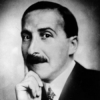Stefan Zweig

Stefan Zweig
Stefan Zweigwas an Austrian novelist, playwright, journalist and biographer. At the height of his literary career, in the 1920s and 1930s, he was one of the most popular writers in the world...
NationalityAustrian
ProfessionWriter
Date of Birth28 November 1881
CountryAustria
hate optimistic race
In their overestimation of the role of civilization, the humanists misunderstand the primary forces of the world of primitive human drives with their untamable violence. With their optimistic view of the role of culture, they (the humanists) trivialize the terrifying, hardly solvable problems of mass hatred and of the great passionate psychoses of the human race.
running dark mind
Nothing whets the intelligence more than a passionate suspicion, nothing develops all the faculties of an immature mind more than a trail running away into the dark.
ideas people world
All my life I have been passionately interested in monomaniacs of any kind, people carried away by a single idea. The more one limits oneself, the closer one is to the infinite; these people, as unworldly as they seem, burrow like termites into their own particular material to construct, in miniature, a strange and utterly individual image of the world.
people poor happy-people
Happy people are poor psychologists.
games play intellectual
In chess, as a purely intellectual game, where randomness is excluded, - for someone to play against himself is absurd ... It is as paradoxical, as attempting to jump over his own shadow.
long guilt forgotten
No guilt is forgotten so long as the conscience still knows of it.
disappointment loneliness stress
The strength of a love is always misjudged if we evaluate it by its immediate cause and not the stress that went before it, the dark and hollow space full of disappointment and loneliness that precedes all the great events in the heart's history.
military war creativity
The transformation of the impossible into reality is always the mark of a demonic will. The only way to recognize a military genius is by the fact that, during the war, he will mock the rules of warfare and will employ creative improvisation instead of tested methods and he will do so at the right moment.
uplifting heart ambition
Only ambition is fired by the coincidences of success and easy accomplishment but nothing is quite as splendidly uplifting to the heart as the defeat of a human being who battles against the invincible superiority of fate. This is always the most grandiose of all tragedies, one sometimes created by a dramatist but created thousands of times by life.
art power ephemeral
Never can the innate power of a work be hidden or locked away. A work of art can be forgotten by time; it can be forbidden and rejected but the elemental will always prevail over the ephemeral.
greatness thinking decision
Sometimes I have the feeling that you are not quite aware--and this honors you--of the historical greatness of your position, that you think too modestly about yourself. Everything you do is destined to be of historic significance. One day, your letters, your decisions, will belong to all mankind, like those of Wagner and Brahms.
fate ever-after vulnerable
Those whom fate has dealt hard knocks remain vulnerable for ever afterwards.
voice today too-much
I had learned and written too much history not to know that the great masses always and at once respond to the force of gravity in the direction of the powers that be. I knew that the same voices which yelled "Heil Schuschnigg" today would thunder "Heil Hitler" tomorrow.
soul stuff firsts
In this instant, shaken to her very depths, this ecstatic human being has a first inkling that the soul is made of stuff so mysteriously elastic that a single event can make it big enough to contain the infinite.